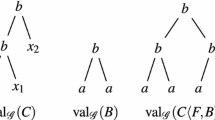Abstract
The simple grammar reduction is an important component in the implementation of Concatenation State Machines (a hardware version of stateless pushdown automata designed for wire-speed network packet classification). We present a comparison and experimental analysis of the best-known algorithms for the grammar reduction. There are two classes of algorithms: the ones that process compressed strings without decompression (polynomial time) and the ones which process strings explicitely. The second category, though exponential time in pessimistic case, is more efficient in the considered practical scenario. There are two approaches to this problem: one processing compressed strings without decompression and another one which processes strings explicitely. It turns out that the second approach is more efficient in the considered practical scenario despite having worst-case exponential time complexity (while the first one is polynomial). The study has been conducted in the context of network packet classification, where simple grammars are used for representing the classification policies.
Preview
Unable to display preview. Download preview PDF.
Similar content being viewed by others
References
Bastien, C., Czyzowicz, J., Fraczak, W., Rytter, W.: Prime normal form and equivalence of simple grammars. In: Farré, J., Litovsky, I., Schmitz, S. (eds.) CIAA 2005. LNCS, vol. 3845, pp. 78–89. Springer, Heidelberg (2006)
Bastien, C., Czyzowicz, J., Fraczak, W., Rytter, W.: Equivalence of Functions Represented by Simple Context-Free Grammars with Output. In: H. Ibarra, O., Dang, Z. (eds.) DLT 2006. LNCS, vol. 4036, pp. 71–82. Springer, Heidelberg (2006)
Caucal, D.: A fast algorithm to decide on simple grammars equivalence. In: Djidjev, H.N. (ed.) Optimal Algorithms. LNCS, vol. 401, pp. 66–85. Springer, Heidelberg (1989)
Debski, W., Fraczak, W.: Concatenation state machines and simple functions. In: Domaratzki, M., Okhotin, A., Salomaa, K., Yu, S. (eds.) CIAA 2004. LNCS, vol. 3317, pp. 113–124. Springer, Heidelberg (2005)
Harrison, M.A.: Introduction to formal language theory. Addison Wesley, Reading (1978)
Hirshfeld, Y., Jerrum, M., Moller, F.: A polynomial algorithm for deciding bisimilarity of normed context-free processes. Theoretical Computer Science 158(1-2), 143–159 (1996)
Korenjak, A.J., Hopcroft, J.E.: Simple deterministic languages. In: Proc. IEEE 7th Annual Symposium on Switching and Automata Theory, IEEE Symposium on Foundations of Computer Science, pp. 36–46 (1966)
Miyazaki, M., Shinohara, A., Takeda, M.: An improved pattern matching for strings in terms of straight-line programs. Journal of Discrete Algorithms 1(1), 187–204 (2000)
Rytter, W.: Grammar Compression, LZ-Encodings, and String Algorithms with Implicit Input. In: Díaz, J., Karhumäki, J., Lepistö, A., Sannella, D. (eds.) ICALP 2004. LNCS, vol. 3142, pp. 15–27. Springer, Heidelberg (2004)
Author information
Authors and Affiliations
Editor information
Editors and Affiliations
Rights and permissions
Copyright information
© 2006 Springer-Verlag Berlin Heidelberg
About this paper
Cite this paper
Bastien, C., Czyzowicz, J., Fraczak, W., Rytter, W. (2006). Reducing Simple Grammars: Exponential Against Highly-Polynomial Time in Practice. In: Ibarra, O.H., Yen, HC. (eds) Implementation and Application of Automata. CIAA 2006. Lecture Notes in Computer Science, vol 4094. Springer, Berlin, Heidelberg. https://doi.org/10.1007/11812128_10
Download citation
DOI: https://doi.org/10.1007/11812128_10
Publisher Name: Springer, Berlin, Heidelberg
Print ISBN: 978-3-540-37213-4
Online ISBN: 978-3-540-37214-1
eBook Packages: Computer ScienceComputer Science (R0)




